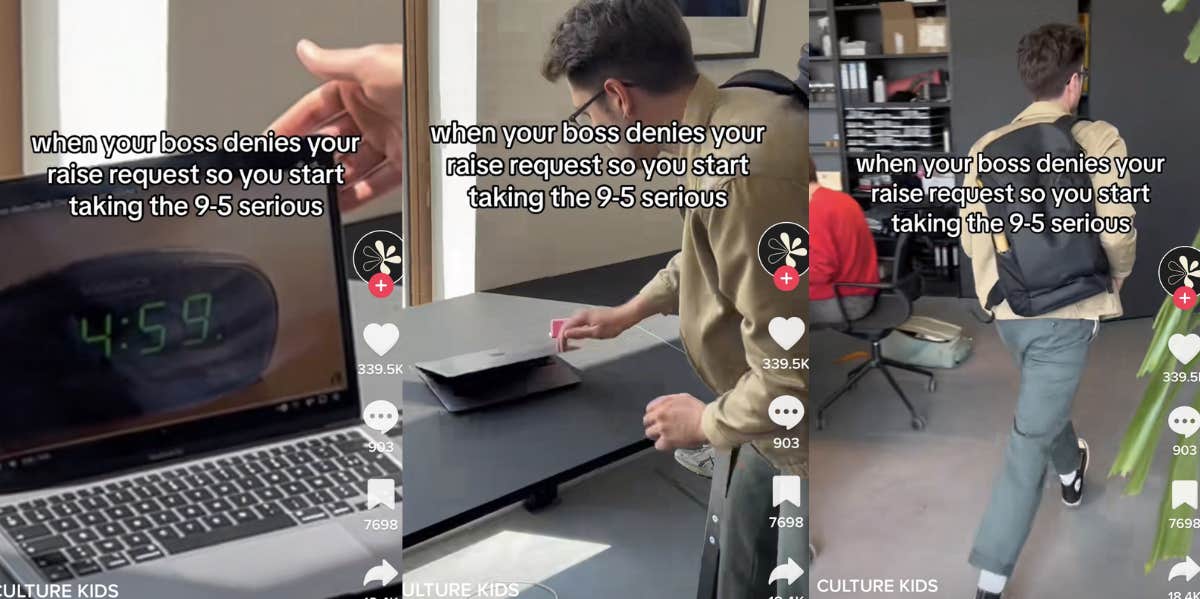Worker Says That He Clocks Out Every Day At 4:59 PM After His Boss Denied Him A Raise
People argued that employees should not be expected to stay past 5 PM, while others acknowledged that it depends on the work environment.
 @culturekidsgroup / TikTok
@culturekidsgroup / TikTok Although the five days a week, 9-5 work schedule is common in the United States, that doesn't mean that many employees can easily function while on the clock. According to research obtained by Zippia, 89% of U.S. workers have experienced burnout within the past year.
Still, almost two-thirds of employees work overtime at least once a week, with 25% of them working over 70 hours a week.
When some employees begin working beyond scheduled hours, they may ask their boss for a raise. It is a reasonable request, although some employers may not believe so. Some employees choose to retaliate against their bosses by not providing them with an extra second of work if they are denied higher pay.
One employee decided to leave work at 4:59 PM after he was denied a raise by his boss.
TikTok user @culturekidsgroup often posts videos highlighting the problems in today’s work culture. One of their most recent videos, which has racked up over 3 million views, depicts an employee who was denied a raise by his boss despite working overtime.
After his boss refused to fulfill his request, the employee decided that he would no longer be staying overtime under any circumstances, clocking out at exactly 4:59 PM each day.
“When your boss denies your raise request so you start taking the 9-5 serious,” the employee wrote in the text overlay of the video. The video demonstrates an image of a clock radio, the time reading 4:59 PM.
As soon as the clock hits 5 PM, the man closes his laptop and goes on his way out of the office as Taylor Swift’s “Karma” plays in the background. It is unclear if the employee still had tasks or deadlines to complete.
Many others agreed with the employee, revealing they would also do the same. “I take the 9-5 seriously from the day I start my job,” one TikTok user commented. “5 PM? On the dot?? Amateur. I'm out by 4:55 at the absolute latest!” another user shared.
Other users argued that employees should not even be expected to stay past 5 PM. “Never give away a single minute of your time for free. Companies certainly don’t do it, why should we?” one user wrote. “Even if I get a raise... isn’t that normal to leave after I finished work?” another user pointed out.
Other employees reported that they felt pressure to stay at their jobs even after the time ticked past 5 PM.
“You have to read the room and the environment,” one user commented. “It all depends on the management,” another user wrote.
Even if employers refuse a worker’s request for a raise if they are working overtime, they are generally required to compensate employees for their extra hours if their employees are covered by the Fair Labor Standards Act. Overtime is usually considered anything beyond 40 hours a week.
Still, even if employees are paid overtime, it is not recommended that they spend the majority of their time working. Overworked employees are prone to suffering from burnout, a decline in their mental well-being, and exhaustion, which can contribute to an unhealthy work environment and decreased productivity.
While working full-time, it is essential to maintain a fair balance between work and personal life, while contributing the minimum work that is required at your job.
In most cases, it will not make the difference to your boss as you may believe it will. “The only people who will remember you staying late without overtime in 20 years are your kids!” one TikTok user accurately noted.
Megan Quinn is a writer at YourTango who covers entertainment and news, self, love, and relationships.

